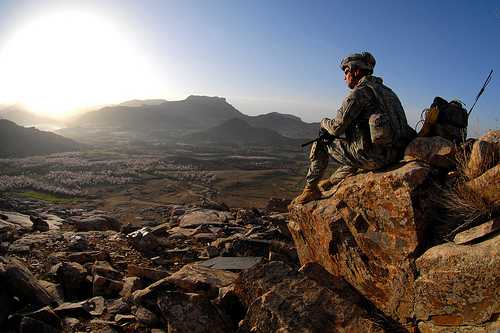Corruption in Afghanistan: Blocking the Way to Civil Society

Progressives’ hopes for an end to the war in Afghanistan were dashed earlier this month when President Barack Obama announced a 30,000-strong troop increase. This shouldn’t have come as a surprise. While coming out forcefully for a drawdown in Iraq, Obama has said all along that Afghanistan was a “war of necessity.” This comes as a majority of Americans see war as not worth fighting.
Civil society in Afghanistan has been ravaged by twenty-three years of war, and where it does exist — in the tribal elder structure and amongst religious leaders — it has been limited and unable to exert a strong influence over the state apparatus.
A telling case: Kabul Mayor Abdul Ahad Sahebi was recently convicted on corruption charges and sentenced to four years in prison; however, he refuses to submit, and remains entrenched in city hall. Why? According to Al Jazeera:
“The government departments involved in the case have so far failed to agree on who should enforce the ruling against Sehebi. Neither the courts nor the police say they have the ability to seize Sehebi and send him to jail, and he is still receiving police protection at city hall.”
Keep in mind that this brand of incompetence and lawlessness is the status quo eight years after the overthrow of the Taliban. What’s more, Sehebi is the first official convicted under President Hamid Karzai’s new anti-corruption program. Can you smell the irony?
The spoils of government incompetence and corruption are practically everywhere in Afghanistan. Millions of dollars have disappeared, construction projects remain half finished, and there is a shortage of honest accountants and fraud investigators. The Taliban initially came to power in the 1990s on a “law and order” platform, and according to Al Jazeera, national indignation over government corruption just might stoke a Taliban renaissance.
“Analysts say public outrage over corruption and bad governance is fueling support for the Taliban, who were ousted from power in the US-led invasion of 2001.”
A military surge alone will not address dysfunctional civil society, even if there is increased security — which is far from guaranteed. The Afghan state and Afghan civil society, the judiciary, the education system, and economic opportunities all need to be strengthened. A civilian surge — American civilians, not soldiers, on the ground working with Afghans to strengthen civil society — could be a major component working toward that goal. Unfortunately, according to Al Jazeera, the US is further “militarizing” aid:
“A number of aid organizations have told Al Jazeera they have turned down funding from the US government as the money has strings attached to military operations.”
Al Jazeera also notes that humanitarian groups fell short on fund-raising goals by $200 million last year, a number that dwarfs in comparison to the troop increase price tag, which bears a figure of tens of billions of dollars.
But all this is unlikely to happen. The State Department claims it is already “surging” its personnel on the ground (increasing their numbers to a lean 974, according to Foreign Policy magazine), but at the same time the UN is leaving and any US increase may barely offset that.
All told, the situation in Afghanistan is bleak.
Not even a week after Sehebi was convicted of corruption, his deputy-mayor Wahibuddin Sadat was also arrested and charged with corruption. It comes as no surprise, then, that Corruption Perceptions Index ranked Afghanistan second only to Somalia. Until corruption is staunched, the future prospects of Afghan civil society remain fragile.
Photo by Sgt. Adam Mancini, courtesy the U.S. Army on Flickr Creative Commons.






